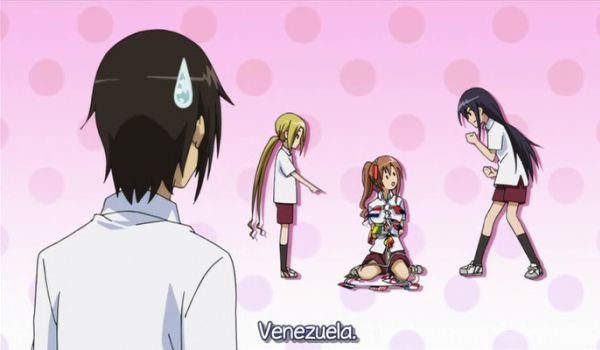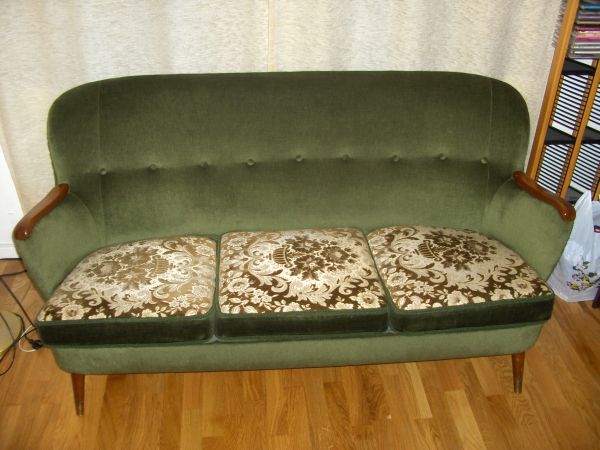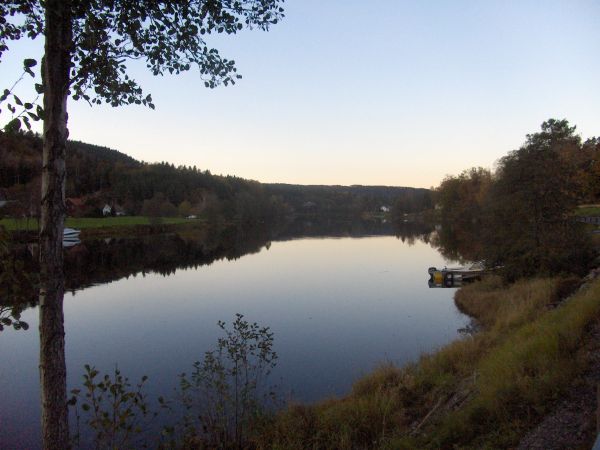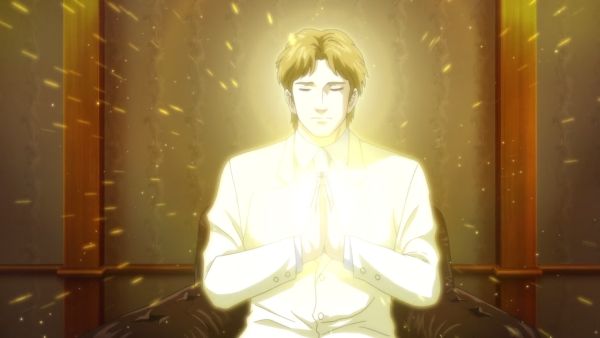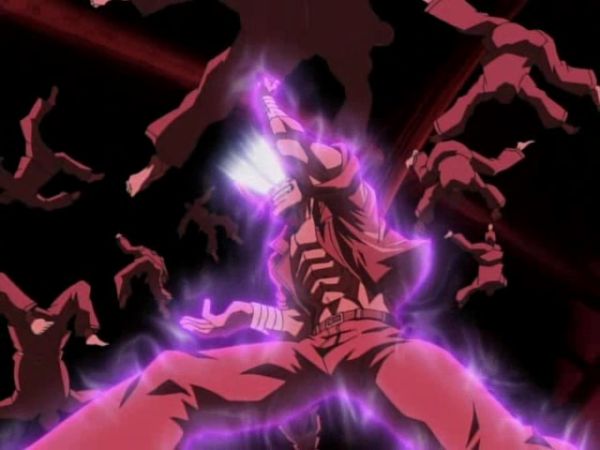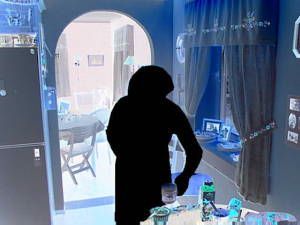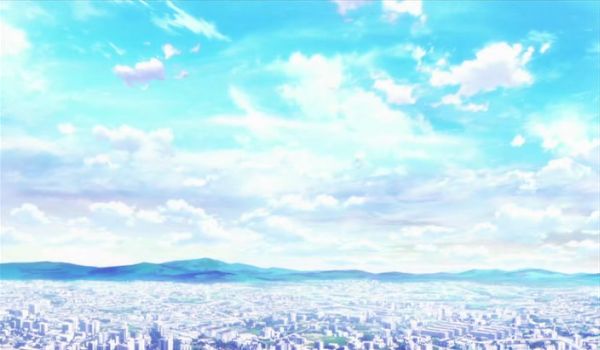
Living in the world, under the Light.
Thanks to years of journaling, I had at least a theoretical warning. I have noted through the years that I usually get sick the night or at most the day after I return from a trip. Whether it has lasted two days or a week, the symptoms are still the same: Queasiness and loose bowels to border on diarrhea, and a generic feeling of malaise. Â I thought for a while that the train ride home had something to do with it, but I had pretty much given up that idea already. So I was not surprised that it happened tonight too, despite traveling with bus and not very far (although further again than to work).
My current theory is that the body is flushing the unusual stuff I have eaten, so it is ready to return to the usual diet now that I have returned home. In this case, two days of cafeteria and hotel food, plus some snacks, but the snacks are actually the most normal part of it. Â I doubt either the cafeteria or the hotel would serve anything that would give us food poisoning. Sure, it happens, even in Norway, but it is bad PR so commercial establishments go out of their way to avoid it.
Nor did I eat any meat, although I took a quarter of an egg for lunch today. Over the last few years I have been eating less and less meat, not because my religion specifically forbids it, I just find it distasteful. I feel that dining on the corpses of dead animals is something that should be reserved for dire emergency. If this was a moral standpoint, I wouldn’t be eating milk products either, since modern agriculture does not retire cows in a dignified manner, much less their calves. As I said, I just find meat distasteful, and to a slightly lesser degree fish.
In reality, milk makes up a fairly large part of my diet in various forms. Come to think of it, not eating yogurt at all when I usually eat it at least daily was probably a bad idea. The gut flora would naturally go wild. The strange part is that it did not do it until I came back. Now, this time it was just two days, but I have been away for up to a week in the past (when spending Christmas with my friends) and while I did have some agitation of the bowels, it was very rarely on the scale I experienced once I got home. Â Honestly, my best guess is that the deeper parts of my brain recognize that I am home and tell my digestive tract to get rid of the weird stuff so I can go back to a normal diet with a fresh start.
Being mentally prepared, I have felt somewhat less panicky than I usually do during the onset of a sickness. Â Still, I am giving some thought to the benefits and malefits of continued life in the body.
***
Of course, in real life God has a lot of other things to think about too, like how my life or death would impact other people or the carbon dioxide content in the atmosphere and a host of things I cannot even begin to imagine. It is not all about me, except up here in my small deluded head. But that’s where I report from…
And in my head, living for several more decades would be good for my soul even if I continued to play computer games, read blogs and work at a job I am not very good at. Why? Because this life is mostly harmless, and the more harmless decades I can put between me and my childhood and youth of fear, anger and hate, the better.
Much of my time then was filled with a horrifying darkness that is, in essence, a kind of hell. Buddhists seem to call this the “hell of strife”, in which people wander in fear and hate, attacking each other and with each confrontation becoming more certain of the others’ evil, without noticing their own. This was how it was with me. Â Even if I had been good, I would probably still have been attacked, but I was not good. Quite the opposite. Sticks and stones may break my bones, but my words hurt other people, and I either did not think about it or enjoyed it immensely, depending on whom. I considered myself a lily among thorns or something. A saint among demons.
I may wish that I had been told the Truth at a much earlier age, but realistically, I would probably not have been ready for it. And meeting it before I was ready, I would probably have become immunized to it, in whole or in part, excusing myself and locking it away as something I had already met and rejected. And so I would have been stuck in the dark, for who knows how long. Â But as it was, the Light eventually came to me at a time when I was open enough for it, around the age of 15, in my grandfather’s rocking chair, while reading a small tract by Elias Aslaksen.
For years after this, the harvest of those years threw a dark shadow over my life. Â Even in my 20es, my dreams were routinely filled with fear and hate and murder. I dreamed about killing innumerable nameless men. And not in any kind of meaningful context, like saving my country or protecting the innocent. It was fear and rage, mostly fear from what I remember. Kill them before they could kill me. With guns, ax, knife, stones, even my bare hands. Â Night after night sometimes, certainly it seems very often now that I look back.
Not satisfied with ruling my nights, the darkness sometimes shot into the day, suddenly and unexpectedly. Some small event might trigger it, even just a thought, but sometimes it would just burst into my consciousness for no reason that I can remember: A sudden vision of myself opening fire on bystanders, driving a car into a crowd, stabbing someone over and over, kicking their head against the concrete until it broke. Â Thoughts like that, sudden, nightmarish, almost insane. Â Then moments later I would catch myself and shudder at the hellish visions. Â And I learned to not trust myself, as I had already learned to not trust others.
Things have changed. I still set bullies on fire, in City of Heroes, but I no longer have the same feelings I used to have. Rather, my recent characters of that type are wreathed in a white, purifying soulfire that burns away the darkness in my enemies, or that is how I perceive it. The actual game mechanics have not changed, but my way of seeing it has, and the graphics and play style corresponds to that. I fight not for revenge, but to protect the innocent and purify the guilty. Â ^_^
Be that as it may, there may be limits to how long I am going to enjoy even that game, though I know not exactly by now. Â But I have noticed that for each passing season, I find it harder to return to Age of Conan, a game that is a masterpiece of lifelike graphics (it was at least for a time the only game with a separate butt size slider, albeit limited in scope). Unfortunately the atmosphere of the game is very dark, and very much like the aforementioned Hell of Strife.
Described in few words, the basic gameplay is the same as in City of Heroes: Defeat enemies, either on your own or preferably together with others. But Age of Conan is, as befits the novels from which it is derived, a dark and treacherous place. One man’s hero is another man’s villain. There is a delight in destruction, blood splattering from severed heads to rain on the inside of your screen, and many of the classes either consorting with demons or gaining strength from acts of destruction, stuff like that. Â It is hard to point out each detail, but there is a subtle aura of darkness and treacherous magic that pervades the game world. I find it repellent now. The current me, whose eyes are set on the Realm of Light, find such an atmosphere harder and harder to bear with each passing season.
I read a book last week, after the glowing recommendation of my online friend Alistair Young, a.k.a the Cerebrate. (Unlike me, his official name is not unique in the world. Really, does it cost that much to add a name to become unique? I would happily have done it, but unless one of my relatives does something crazy, there is and will only be one Magnus Itland in the world. And the world is probably quite happy with that.
Be that as it may, the book was a work of fiction, the first in the Dresden Files series of supernatural detective stories. Wizard Private Investigator more exactly. Â When Mr Young loves something, I have found that I usually like it, admire it or at the very least respect it. This also came to pass. I did not like the book, but I found it very well written. Â The reason why I did not go right ahead and buy the next was this: It was a dark world, with copious amounts of fear and death. Sure, so is real life for some people, especially in countries with war or civil war. Â But that is not entertainment. It is not something we immerse ourselves in for our enjoyment. Â The book did indeed remind me of Age of Conan, although somewhat less so.
And that is when I realized that I have begun to change further than I did simply by the passing of the years and the fading of the memories. That some kind of anchor for my soul has gone ahead of me, a possible future self perhaps, beckoning to me from the brightness of the Realm of Light, a barely audible song about coming home.
“But I’m not ready yet” to quote Chris de Burgh in his song Living in the World. Â (Lyrics and temporary streaming for my friends). Â I am pretty sure de Burgh also has his home in the Realm of Light at the least, as can be glimpsed in the sheer wingspan of his soul. But for him, as for me, it is still a question of whether we will return there. And I’m not ready yet. Probably.
I am still shakeable. My light still flickers when my body is darkened by illness. I want it to shine brightly even then, but I know there are still limits to how much I can take. Â I want to live in the world with my anchor in the Light. I want to keep reading the saints and sages of the past and present, I want to work, and play, and share, and watch my life grow like a plant until it can bear fruit for those who will survive me. Until my white light can burn more brightly when the lamp that carries it cracks and start breaking up. Â But I am fairly sure I am not ready yet.

